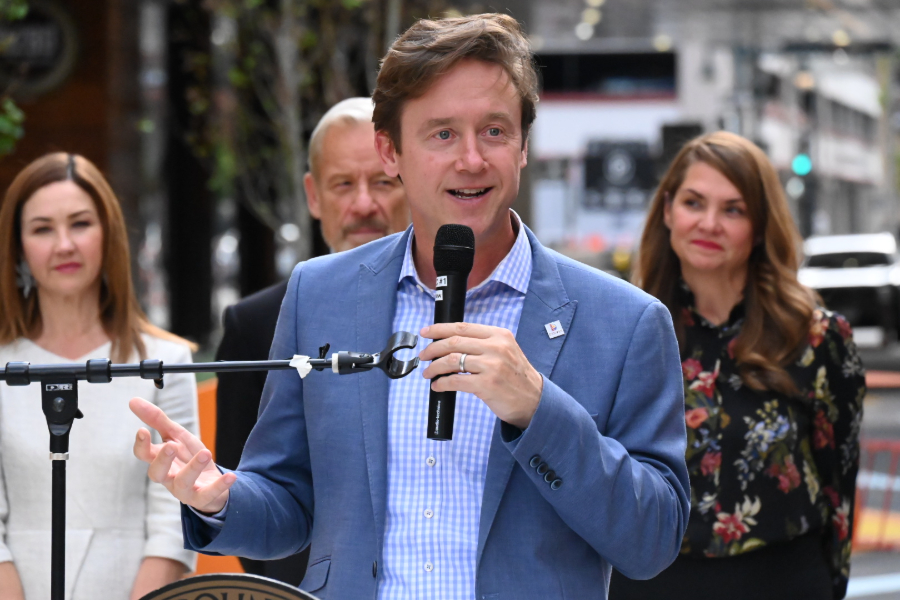
Bennito L. Kelty

Audio By Carbonatix
The City of Denver has approved the $37 million purchase of the Denver Pavilions, a multi-level open-air mall off 16th Street, by the Downtown Development Authority .
“Many of us have memories of the Denver Pavilions, whether it was your high school prom dinner, whether it was a first date at the movies, whether it was a great family dinner,” Mayor Mike Johnston said during an announcement of the deal on Tuesday, September 30. “This has been an incredibly important part of Denver for many, many years. Our dream is that it remains a critical icon in the city for another forty years.”
An independent agency with oversight by the City of Denver, the DDA was created in 2008 to support the revitalization of Union Station, using bonds and tax increment financing to fund developments. Under TIF, while property tax rates stay the same, any increases in tax revenue generated by the rising property values are collected to repay bonds.
Last year, about 2,500 Denver residents who live or work within the DDA’s original boundaries voted in favor of a ballot measure to renew the DDA and allow it to issue $570 million in bonds to fund projects that improve downtown long-term. The DDA can now fund improvements within the area stretching from the McNichols Building and Civic Center Park, down to Union Station, west to Speer Boulevard, and east to the Ballpark General Improvement District.
In August, the city announced that the DDA will buy the two parking lots behind the Denver Pavilions for $23 million from developer Brookfield Properties. Since the Pavilions opened in 2008, those parking lots were always separate from the mall property, Johnston noted in announcing the Pavilions deal.
Johnston explained that the $37 million to purchase the Pavilions come from “the mutual commitment of the businesses who support the tax base here” in downtown Denver. Doug Tisdale, the chair of the DDA board, called it “a phenomenal deal.” According to Tisdale, the DDA will hire an “international retail specialist” to help with “the renaissance of the Pavilions,” which currently has a 41 percent vacancy rate among its storefronts.
According to Johnston, the Pavilions was valued ten years ago at $140 million, but the DDA got “a great deal for Denverites” by buying it for $37 million from Gart Properties in the wake of the pandemic and construction on 16th Street, which will celebrate its full reopening on Saturday, October 4.
“The Pavilions has had five years of COVID, construction and closures,” the mayor said. “The Pavilions took a hard part of the brunt of those five years of construction on 16th.”
Gart Properties had an $85 million loan due in July. Bill Mosher, the mayor’s chief projects officer, tells Westword that he doesn’t know if the company paid off the loan; “our $37 million will probably go towards the $85 million, and that’ll be the end of it.”
During the announcement, Mosher said that the sale of the Pavilions is expected to be finalized by the end of the year, adding that Gart Properties had submitted an application to the DDA “asking for the community to step in” and save the Pavilions.
According to Denver City Council President Amanda Sandoval, the city will build around “anchor tenants” like Maggiano’s, the United Artists cinema and H&M.
Many people who grew up in the metro area after the Pavilions opened in 1998 have fond memories of the theater, busker Robo Mike and long-gone businesses like the Hard Rock Cafe. The mall is a shell of its former self, despite stores that have held out, like the United Artists cinema and Coyote Ugly. Glenarm Plaza, which closed the street that runs through the property during the pandemic, began allowing outdoor alcoholic consumption in August to boost interest in the area.
The city recently laid out a plan to solve a $200 million deficit looming over the 2026 budget, which led to layoffs and cuts to city department budgets; at the announcement, Johnston said that “the most important thing to know” about the Pavilions deal is that it won’t impact the city’s budget.
“This is an investment made by the [DDA], it’s not made by the City of Denver,” Johnston clarified. “It’s not by our general fund. It’s not made by capital funds. No part of these dollars could be used to support a city employee, to pay for a city program.”
Johnston’s press conference was held at the Pavilions. A handful of pedestrians on 16th Street stopped to listen, including Matthew Hogue, who works on 16th Street and lives next to Park Hill Golf Course. He believes “16th Street is coming back,” but adds that what matters for him is that the city follows through on big projects.
“If you’re going to do it, have a plan, execute the plan, stick to it. You shouldn’t have to ask for any more money or resources from taxpayers,” he says. “It should be something planned out and ready to go.“